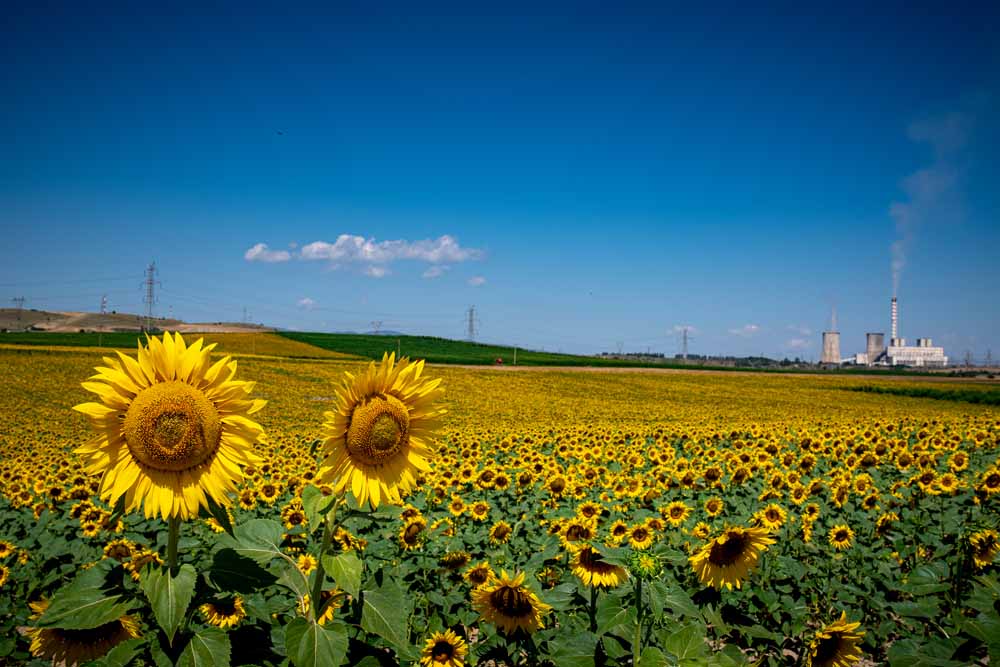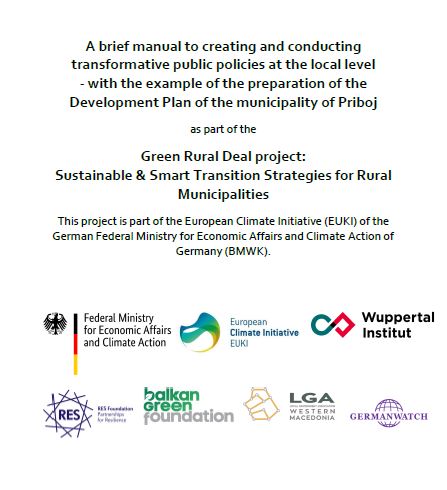Green Rural Deal
This project is completed. It developed methods and tools to support rural regions in Greece, Serbia and Kosovo in their transition to a zero-carbon economy by inviting core regional stakeholders to co-create project and strategies.
Climate Policy Climate Strategies and Plans Economy

Project info
Germany, Greece, Kosovo, Serbia
10/20 - 12/22
Local governments, Civil society, Private sector
574,738.00 €
Contact info
Katja Witte
- Balkan Green Foundation (BGF)
- Germanwatch e.V.
- Regional association of local government of Western Macedonia
- RES Foundation
Background
Municipalities in Europe’s rural regions face different challenges than urban regions with regards to the sustainability transformation: The shrinking and ageing of their population, a shortage of skilled workers and, simultaneously, a high level of unemployment. In these situations, the trade-off between creating jobs and saving the climate seems all too real. Green Rural Deal supports rural municipalities in building up their transformative capacities and developing suitable solutions for a zero-carbon economy.

Project
A successful sustainability strategy requires reliable data. Therefore, the project supported local stakeholders in Western Macedonia (Greece), Kamenica (Kosovo) and Priboj (Serbia) in gathering and assessing key socio-economic data relevant for a transition to a zero-carbon economy.
As a next step, the project invited the same local and regional stakeholders to co-create project ideas and concepts in a series of events and formats, including one study trip to a rural region in Germany. Furthermore, the partners develop tools and instruments which to align regional economic development strategies with climate targets. Based on learnings from the three target regions, the project develops recommendations for other rural regions in similar processes. Finally, the partners develop policy briefings in order to raise awareness for rural regions among higher levels of government.
A toolkit developed within the project assesses the impact of planned investments and transformative projects on the transition of an area (region/municipality) to a sustainable growth model. Another policy assessment toolkit supports the development of inclusive green growth policies anchored in the overall rural development objectives. It takes into account the core principles of green growth, such as inclusiveness, social impact, transparency and sustainability.
Based on the lessons learned in the three target regions, the project drafted policy recommendations on instruments and mechanisms for the transformation to a green economy in rural regions. The policy brief provides national, regional and local authorities with information and advice to support the design of decarbonisation policies to implement structural change solutions at local and regional level.

Results
- In Priboj, Serbia, a development plan was crafted involving diverse participants from administration, education, culture, companies, and civil society. The local population actively engaged through an online procedure. After its adoption, the plan spurred impactful actions, such as decarbonizing the public heating system. Recognizing its transformative potential, the RES Foundation compiled a comprehensive manual, sharing Priboj’s experiences. This valuable guide extends its reach to local self-governments in the Western Balkans and beyond, inspiring communities and interested parties at the local level. Priboj’s success story illuminates a path towards sustainability and serves as a beacon of hope for a greener future throughout Europe.
- In a collaborative effort, two online tools were developed to assess sustainability-oriented projects and policies in municipalities. These tools gained widespread adoption by regional authorities, 15 municipalities, a regional development agency, four chambers of entrepreneurs, and a leading university evaluation committee. The first Tool evaluates the impact of investments on sustainable growth, benefiting rural regions across Greece, the Western Balkans, and Europe. The second Tool, a policy toolkit, helps develop inclusive green growth policies aligned with broader development goals. Its reach extends to rural regions in the Western Balkans, Greece, and beyond. This success story highlights the transformative potential of these tools in driving sustainable development.
- Building upon the knowledge and experience gained in the Green Rural Deal project, a comprehensive joint policy brief was developed, providing valuable insights, recommendations, and tools for decarbonization policies and structural change in rural regions. The brief addresses national, regional, and local authorities, offering policy recommendations, best practices, and mechanisms to facilitate the transition towards a green economy. While individual sections focus on specific target regions, the overall document encompasses lessons learned and recommendations from the three regions, ensuring a comprehensive and compact resource for similar rural areas. Partner organizations disseminated the policy brief via email exchanges, websites, and various platforms, reaching partner communities in the Western Balkans and providing actionable insights for sustainable structural change. The online document is widely distributed through project partner websites and social media channels, offering concrete suggestions for actors both within and beyond the European Union.
Last update: July 2024

